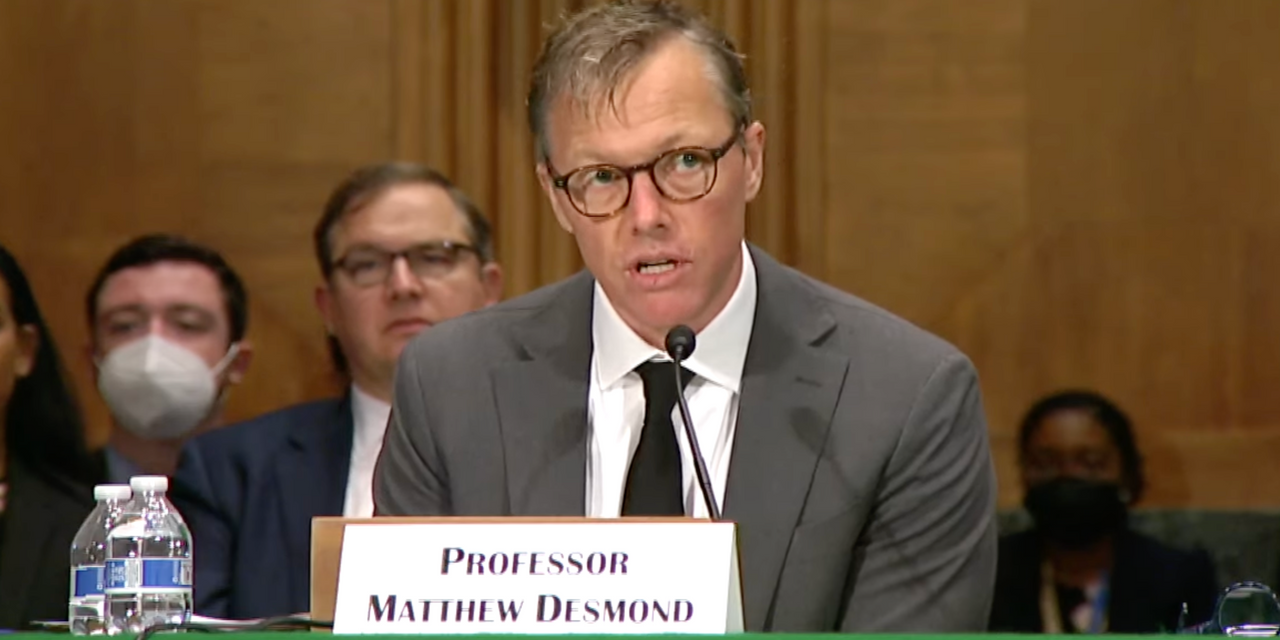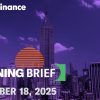Americans benefiting from a “lopsided welfare state” should be more critical of tax breaks and policy structures that potentially add to their wealth at the expense of others, the leading U.S. poverty researcher Matthew Desmond urged Wednesday during an event at the Urban Institute.
“Many of us on the left and the right and in the center, we’ve been pretty comfortable with absolving theories of the problem — as if there’s all these tens of millions of people that don’t have enough to make basic necessities, and it’s nobody’s fault,” Desmond said in a conversation with Mary K. Cunningham, the vice president for metropolitan housing and communities policy at the Urban Institute.
“I’ve grown quite weary of those absolving theories of poverty,” he added. “Many of us consume the cheap goods and services the working poor produce; many of us are invested in the stock market. And don’t we benefit when our savings go up and up, even when that comes at the cost of a human sacrifice?”
Instead of settling into that kind of thinking, Americans should undertake a poverty “audit” and consider the ways in which they’re connected to systems that promote and maintain economic inequality, Desmond, a Pulitzer Prize-winning professor of sociology at Princeton University, said in his latest book, “Poverty, by America.” It’s one step people can take to become what he calls a “poverty abolitionist.”
At the event Wednesday, Desmond said consumers could further engage by shopping and investing in a way that expresses solidarity with workers and poor people. That could mean turning to B Corporations — companies that have been certified for having greater accountability, transparency, and social and environmental performances — or consulting organizations like Union Plus, which provides lists of union-made products.
But people should also “take a hard look at our own tax breaks, and start having different conversations with our neighbors, and our coworkers, and our family members, about those tax breaks,” he said.
“We just paid our taxes — and most of us who paid our taxes, we were like, ‘Crap, I gotta pay my taxes,’ and that’s just how we talk about taxes. ‘Taxes should hurt,’ Reagan famously said, and they do hurt,” Desmond said.
“But what if next time tax season rolls along and your neighbor leans over the fence and is like, ‘Dude, did you see the property bill this year?’” he continued. “What if you responded by being like, ‘Dude, I can’t believe I get a mortgage deduction for my home — and I don’t need this thing! And I wouldn’t have a problem with it if there wasn’t this eviction crisis and kids weren’t getting evicted every day in this country. So I’m donating my deduction to local eviction defense, and I’m going to write my congressperson saying that they should wind this down for families like me.’”
People in the U.S. also have to turn against segregation, he said, by being more engaged in conversations about zoning reform and less satisfied with existing efforts on housing affordability.
And if making a real difference feels impossible, Desmond said, remember that it’s “easier to change norms than beliefs.” Making opportunity hoarding “uncool” and making adjustments to our own behaviors might inspire others to follow along, he said, referencing a concept scholars have used to describe how certain groups control resources while excluding others.
From the archives (2017): Opinion: Here’s how wealthy Americans keep the best for themselves
‘Lie of scarcity’
If Americans have become complacent to the country’s official poverty rate of 11.6% — which translates to tens of millions of people living at or below the federal poverty level — it’s not because they haven’t been shown any alternatives. For example, the expanded child tax credit implemented during the pandemic, which provided many U.S. families with automatic monthly payments of $250 or $300 per child before its expiration at the end of 2021, was linked to a massive but potentially temporary drop in child poverty.
Efforts to extend the benefit relied on Congress passing President Joe Biden’s Build Back Better agenda, which Sen. Joe Manchin, a West Virginia Democrat, declined to support. The package, at $1.75 trillion, was too costly, Manchin said at the time.
But that kind of policy change requires more than just an attitude shift — it needs funding, Desmond said. He noted that one study showed that if the wealthiest 1% of Americans paid the taxes they owed and stopped “evading taxes so successfully,” the country could raise an extra $175 billion a year, which would be “more than enough” to bring back that expanded tax credit. It could more than double the country’s investments in affordable housing, and it’s “almost enough to pull everyone below the official poverty line above it,” he said.
“I think that we have to reject this lie of scarcity,” Desmond said. “We have to cultivate a new language and stop repeating and accepting this fabricated scarcity — and stop using our grown-up voice to say, ‘Well, land of scarce resources.’ That’s not this land.”
From the archives (2022): Racial and economic inequality persists. Why do many people deny it?
Read the full article here








